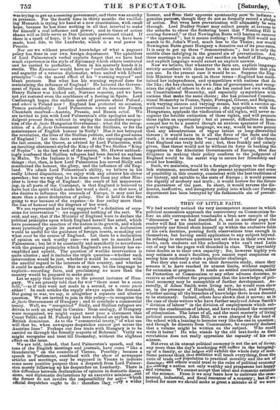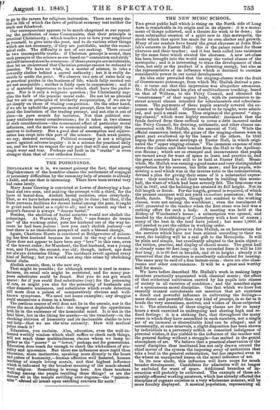THEY OF LITTLE FAITH.
WE had scarcely noticed the very incompetent manner in which political economists approach the controversy on Communism be- fore an able correspondent vouchsafes a bran new sample of the "discussion" as we had described it, and in another page the reader will find his contribution. It is curious to observe how completely our friend shuts himself up within the exclusive folds of his own doctrine, pouring forth observations true enough in themselves, but having small application to any subject beyond. In refusing to entertain questions not set down in their own text- books, such students act like schoolboys who can't read Latin out of any but the pages well thumbed in class. They inevitably raise doubts as to their own capacity ; for, however highly you may estimate a man's faculties, you cannot repel suspicions on seeing him uniformly evade a particular challenge. But they also cast a slur on their favourite study, since they assume it to have reached its utmost limits, without capacity for extension Cr progress. It needs no settled convictions, either on Protection or Communism or any other adverse doctrine, to receive as self-evident the proposition that the knowledge of poli- tical economy may be susceptible of further development. As- suredly, if Adam Smith were living now, he would soon show us, in the presence of Humboldt, and Herschel, and Faraday, whether among all the branches of knowledge there is one doomed to be stationary. Indeed, others have shown that it moves; as in the case of those writers who have further analyzed Adam Smith's "division of labour" in the division of employments which sub- serves the combination of labour, and have explained the economy of colonization. The latest of all, and the most masterly of living political economists, John Mil], is even charged by the herd of the school with a leaning to heresies very like the one in question; and though he dissents from Communism, he expressly declares that a volume might be written on the subject. Who could write it better? He who stands by the old text-books as final revelations does not really appreciate the capacity of his own science.
But even at its utmoat political economy is not the art of living, any more than the daY's marketing will suffice in the bringing- up of a family, or the leclkst will exhibit the whole duty of man. Some persons thinkVaat statistics will teach everything, from the ratio of trade t wir population to practical morality and the art of dancing( an others would trust to the rules of political economy fQ,.aaking a nation not only wealthy and prosperous but happy and virtuous. We cannot accept that ideal and romantic estimate of the science. From it we may learn how to cultivate the COM. mercial, industrial, and fiscal resources of a eauntry;,; but if we looked for more we should make as great a mistake as if we were to go to the tavern for religious instruction. There are many du- -ties in life of which the laws of political economy test neither the with nor falsehood. Our correspondent appears to be much chagrined at our repeat- ing the profession of some Communists, that their principle is practical Christianity ; which teaches you to love your neighbour as yourself, to give unto the poor, and to do various other things which are not necessary, if they are justifiable, under the econo- mical code. The difficulty is not of our making. There cannot be two incompatible truths : if Christian precept is sound, then such precepts of the science as are based on" contention and strife" and self-interest must be erroneous : if those precepts are indubitable, then let us understand that Christian precept cannot be reduced to practice. We have no wish, in a matter of science, to take a cowardly shelter behind a sacred authority ; but it is really de- sirable to settle the point. We observe two sets of rules held up as practical guides in the business of life, which fully carried out are not compatible ; neither is fairly open to compromise ; and it is of material importance to know which shall have the prefer- ence. Nor is it only a religious question ; for Christianity sup- plies the bulk of the popular moral code. Do not let us pretend that we act on principles of brotherly reciprocation, if we are to act simply on those of trading competition. On the other hand, if we are to uphold the generous moral precept, then let us under- stand the limitation of the trading precept, and not cite it out of place—in pure morals for instance. Not that political eco- nomy excludes moral considerations ; for it takes in two classes of such considerations—the economical effect of particular moral influences, and the motives to economical action, especially the motives to industry. But a good deal of assumption and equivo- cation has crept into this part of the science. Such weak points, we say, demand revision. Political economy is not a religion sacred against adverse inquiry : it is a science for practical daily use, and we have no respect for any part that will not stand good rough wear and tear. Perhaps our faith in its "truths" is even stronger than that of our orthodox friend.



























 Previous page
Previous page